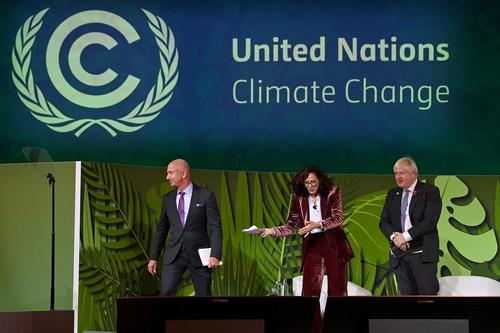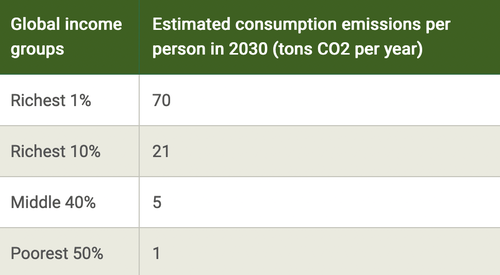Watchman: ‘Luxury’ Pollution By Global Mega-Rich Satan Soldiers Is The Real Problem

The richest people on the planet, representing a small sliver of the total population, are emitting carbon dioxide at a rate that's imperiling hopes of keeping global heating below 1.5°C, prompting fresh calls for government action to rein in "luxury" pollution and combat the intertwined crises of inequality and climate change.
New research by the Institute for European Environmental Policy (IEEP) and the Stockholm Environment Institute (SEI) shows that by 2030, the carbon footprints of the wealthiest 1% of humanity are on track to be 30 times larger than the size compatible with limiting global warming to 1.5°C by the end of the century, the Paris Agreement's more ambitious temperature target.


If current trends continue, the richest 1% will account for 16% of global CO2 emissions in 2030.
The carbon emissions of the poorest half of the global population, meanwhile, "are set to remain well below the 1.5°C-compatible level," according to the analysis, which was commissioned by Oxfam International and published Friday. The planet has already warmed by roughly 1.1°C, and scientists have said any heating beyond 1.5°C would have destructive consequences worldwide.
"The emissions from a single billionaire spaceflight would exceed the lifetime emissions of someone in the poorest billion people on Earth," Nafkote Dabi, Oxfam's climate policy lead, said in a statement. "A tiny elite appear to have a free pass to pollute. Their oversized emissions are fueling extreme weather around the world and jeopardizing the international goal of limiting global heating."
"The emissions of the wealthiest 10% alone could send us beyond the agreed limit in the next nine years," Dabi added. "This would have catastrophic results for some of the most vulnerable people on Earth who are already facing deadly storms, hunger, and destitution."
Authored by Tim Gore, head of the Low Carbon and Circular Economy program at IEEP, the new research paper notes that "while carbon inequality is often most stark at the global level, inequalities within countries are also very significant."
"They increasingly drive the extent of global inequality, and likely have a greater impact on the political and social acceptability of national emissions reduction efforts," the paper reads. "It is therefore notable that in all of the major emitting countries, the richest 10% and 1% nationally are set to have per capita consumption footprints substantially above the 1.5⁰C global per capita level."
To slash the outsized planet-warming emissions of the global rich, the study calls on policymakers to pursue restrictions on mega-yachts, private jets, and recreational space travel. In a paper published last month, French economist Lucas Chancel estimated that "an 11-minute [space] flight emits no fewer than 75 tonnes of carbon per passenger once indirect emissions are taken into account (and more likely, in the 250-1,000 tonnes range)."
"At the other end of the distribution, about one billion individuals emit less than one tonne per person per year," Chancel observed. "Over their lifetime, this group of one billion individuals does not emit more than 75 tonnes of carbon per person. It therefore takes a few minutes in space travel to emit at least as much carbon as an individual from the bottom billion will emit in her entire lifetime."
Prince Charles, who demands a "military-style campaign" to tackle "climate change," is among those traveling by non-commercial plane to #COP26 in Glasgow from G20 in Rome.https://t.co/utcCTMnAvQ
— Disclose.tv (@disclosetv) November 1, 2021
In addition to targeting sources of "luxury carbon consumption," the analysis by IEEP and SEI also proposes restrictions on "climate-intensive investments like stock-holdings in fossil fuel industries."
"The global emissions gap to keep the 1.5°C Paris goal alive is not the result of the consumption of most of the world's people: it reflects instead the excessive emissions of just the richest citizens on the planet," Gore said in a statement. "It is necessary for governments to target measures at their richest, highest emitters―the climate and inequality crises should be tackled together." Emily Ghosh, a scientist at SEI, agreed, arguing that "carbon inequality must urgently be put at the center of governments efforts to reduce emissions."
"Our research highlights the challenge of ensuring a more equitable distribution of the remaining and rapidly diminishing global carbon budget," said Ghosh. "If we continue on the same trajectory as today, the stark inequalities in income and emissions across the global population will remain, challenging the equity principle at the very heart of the Paris Agreement."
The first psalm warns us not to keep company with evil people. We are told not to listen to their counsel, stand in their way or sit in their seats. The word 'blessed' is translated 'happy' in some newer renderings. Blessing implies the goodness of God will be with such a person. Look for these beatitudes throughout Scripture. If the Word gives us instruction as to what to do to find God pouring out His goodness on us, we should give careful attention to that instruction. You will be blessed if you avoid bad company. Man has a natural tendency to gravitate toward mocking and complaint. Don't!


Be gentle with your skin. Our soaps are kind to your skin and create a creamy, silky lather that is nourishing. Small batches are made by hand. We only use the best natural ingredients. There are no chemicals, phthalates, parabens, sodium laurel sulfate, or detergents. GraniteRidgeSoapworks
Use the code HNEWS10 to receive 10% off your first purchase.
Source: HNewsWire HNewsWire ZeroHedge Reference
StevieRay Hansen
Editor,
HNewsWire.com
[email protected]
Remember, the first people Hitler put in concentration camps weren't the Jews. The first people were the intellectuals, because if you take the intellectuals and the doctors off the street, if you stop people from talking, you can control the people.

Atmospheric Scientist Dr. Joanne Simpson, the first woman in the world to receive a
PhD in meteorology, formerly of NASA, has authored more than 190 studies and has
been called “among the most preeminent scientists of the last 100 years” by
atmospheric scientist Dr. Roger Pielke, Sr. Simpson declared she was ―skeptical‖ of
catastrophic man-made warming in 2008. ―Since I am no longer affiliated with any
organization nor receiving any funding, I can speak quite frankly,‖ Simpson wrote in a
public letter on February 27, 2008. ―The main basis of the claim that man‘s release of
greenhouse gases is the cause of the warming is based almost entirely upon climate models.
We all know the frailty of models concerning the air-surface system. We only need to
watch the weather forecasts,‖ Simpson explained. ―But as a scientist I remain skeptical,‖
she added. [Note: Joanne Simpson died in 2010]